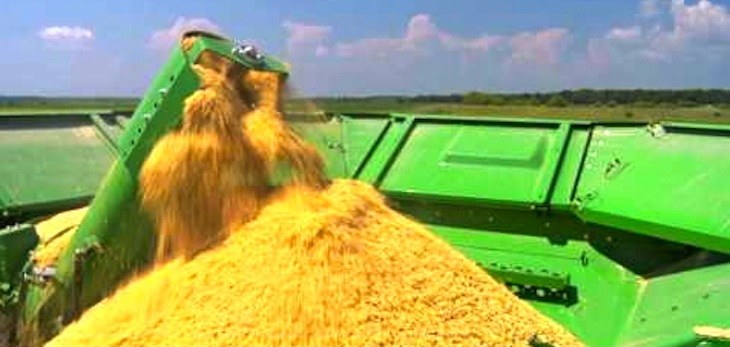Arkansas continued to dominate national rice production in 2017
by June 19, 2018 6:53 pm 1,480 views

Arkansas is commonly referred to as the Natural State, but it could also be called the rice state. Rice farmers in the state planted 1.161 million acres last year, about 47.1% of all rice acres planted in the U.S., according to the B.R. Wells Arkansas Rice Research study issued by the University of Arkansas Division of Agriculture.
Those acres accounted for 82.6 million hundredweight of rice, and it represented 46.4% of the 178.2 million hundredweight produced in the country.
During the last three years, Arkansas has accounted for more than 47% of the nation’s total rice production, the report found. Per acre, farmers had a yield of 164.4 bushels per acre or 7,400 pounds. It was the third highest yield on record in the state and a 570 pound per acre uptick from 2016.
Six counties – Poinsett, Lawrence, Lonoke, Jackson, Greene, and Arkansas – account for 43.6% of the rice crop in state in 2017. Planting during the last year outpaced the five-year average, the report found. By mid-April, farmers had planted 68% of the rice crop, as compared to the 38% average by mid-April on average. By the end of that month 89% had been planted, about 24% of ahead of normal pace.
There are a number of factors that have led to Arkansas becoming the top rice-producing state, Craighead County extension chair Branon Thiesse told Talk Business & Politics. Water retention is key to creating a successful rice paddy.
“We’ve got lots of soils that hold water really well,” he said.
Many parts of the state and especially in the eastern section have flat land that is easy to flood, he said. Clay is a common sub-soil in the region, and it doesn’t allow water to penetrate. The weather is suited to growing rice, and until recently the ground water supply was plentiful, he added.
Several other states grow rice, but none have enough suitable land to grow the same volume as the Natural State.
Rice is grown in 40 of Arkansas’ 75 counties and is predominately grown in the eastern section of the state. The first rice crop was grown on a single acre in Lonoke County in 1902, although there are reports of the crop in the state before the Civil War, according to historians. Rice acres steadily grew from then and by 1955 the federal government initiated a set of controls capping the number of rice acres at 500,000. Controls were lifted in the 1970s, and the number of rice acres continued to grow. The state set its all-time rice acreage record in 2010 when farmers planted 1.785 million acres.
TRADE CONCERNS
A UA Division of Agriculture report published March 8 estimated a negative impact on Arkansas’ rice crop if countries retaliate to tariffs and other trade barriers proposed by President Donald Trump.
The UA economists assumed that only Canada, South Korea, Mexico, Turkey, Japan, the European Union and Taiwan would retaliate to U.S. trade actions.
“Both the U.S. long grain and medium grain rice markets stand to lose from the retaliatory measures of the selected importing countries,” Alvaro Durand-Morat, assistant professor of agriculture, noted in the report. “We estimate total U.S. rice production and exports to drop 1.3 percent and 3 percent, respectively, and domestic consumption increases marginally, as a result of the implementation of import tariffs on U.S. rice.”
Other report findings include:
• The total value of U.S. rice production would decrease by $151 million due to a combination of lower producer prices and output;
• Rice producers’ welfare, measured by the producer surplus, would decrease by $118 million;
• U.S. consumers would benefit from the trade restrictions through lower prices, increasing their welfare some $66 million; and
• Exports to Mexico and Canada would decrease significantly, but the impact would be much smaller in Japan because it already imposes high restrictions on rice imports.
RICE RESEARCH
The crop is so important to the state that a new research center is being built to study rice production. The Arkansas Rice Research Promotion Board has dedicated $4 million toward the construction of a rice research center in Poinsett County.
The center will sit on a 614 acre swath about five miles south of Jonesboro on Arkansas 1 just over the border in Poinsett County. How much the center will cost has not been determined, and final plans are still being formulated, he said. A timetable for work to begin on the project was not released, but officials hope the facility will be operational by 2021.
The Division of Agriculture now conducts research on rice production in Stuttgart at the Rice Research and Extension Center and at the Northeast Research and Extension Center in Keiser. Soil differences are the reason why another research facility is needed, officials said.
